-
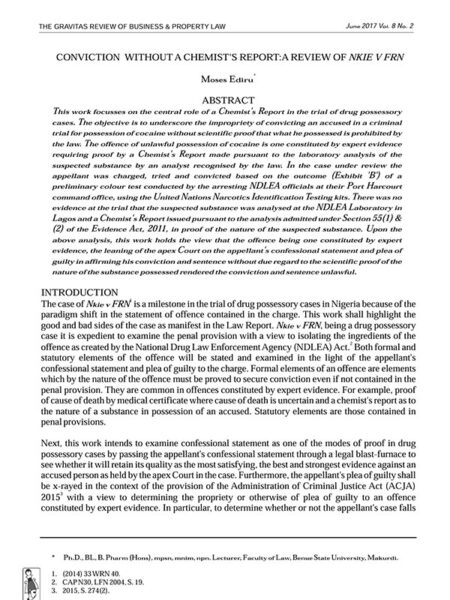
Conviction without a Chemist’s Report: A Review of Nkie v FRN
0₦2,500.00Dr Moses Ediru, of the Faculty of Law, Benue State University in his article “Conviction Without a Chemist’s Report: A Review of Nkie v FRN“, argues that in the trial of drug possessory cases, where the offence is one constituted by expert evidence, presentation of a Chemist’s Report is imperative. In the case under review, the appellant was charged, tried and convicted based on the outcome of a preliminary colour test conducted by the arresting NDLEA officials using the United Nations Narcotics Identification Testing kits. The suspected substance was not analysed at the NDLEA Laboratory and a Chemist’s Report issued pursuant to the analysis, in proof of the nature of the suspected substance. The article argues that the offence being one constituted by expert evidence according to the National Drug Law Enforcement Agency Act, the leaning of the Supreme Court on the appellant’s confessional statement and plea of guilty in affirming his conviction and sentence without due regard to the scientific proof of the nature of the substance possessed rendered the conviction and sentence unlawful.
-
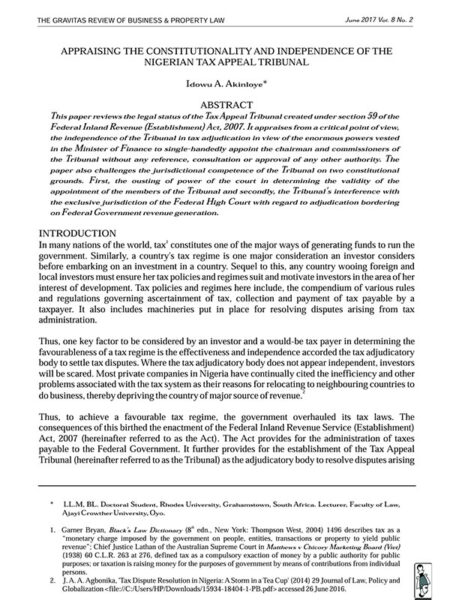
Appraising the Constitutionality and Independence of the Nigerian Tax Appeal Tribunal
0₦2,500.00Idowu Akinloye, of the Faculty of Law, Ajayi Crowther University, Oyo in “Appraising the Constitutionality and Independence of The Nigerian Tax Appeal Tribunal”, examines the jurisdictional competence of the Tax Appeal Tribunal and the constitutionality of its enabling statute, the Federal Inland Revenue Service (Establishment) Act 2007, on several grounds including the likelihood that the appointment of members by the Minister of Finance may not secure the tribunal’s independence and impartiality, ousting of the power of the court in questioning the validity of the appointment of the members offends section 4(8) of the 1999 Constitution, and adjudicating on taxation of companies offends section 251(1) of the Constitution that vests exclusive jurisdiction in such matters in the Federal High Court.
-
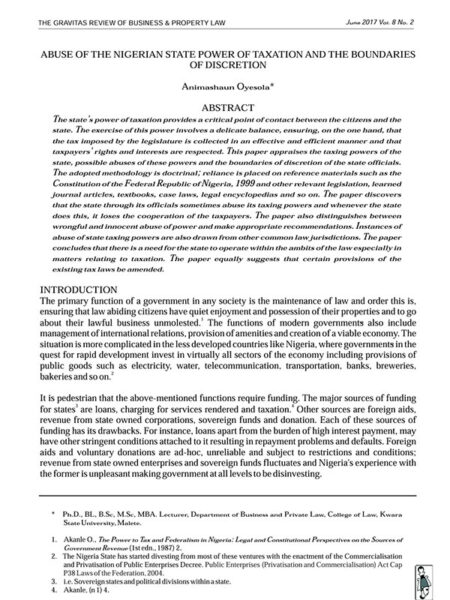
Abuse of the Nigerian State Powers of Taxation and the Boundaries of Discretion
0₦2,500.00Dr Animashaun Oyesola, of the Department of Business & Private Law, Kwara State University, Malete in his article, “Abuse of the Nigerian State Power of Taxation and the Boundaries of Discretion”, appraises the taxing powers of the Nigerian State giving examples of how the powers have been abused and distinguishing between wrongful and innocent abuse. He examines several instances of how state officials have misused their discretion and recommends how taxing statutes may be strengthened without violating the rights of the tax payer.
-
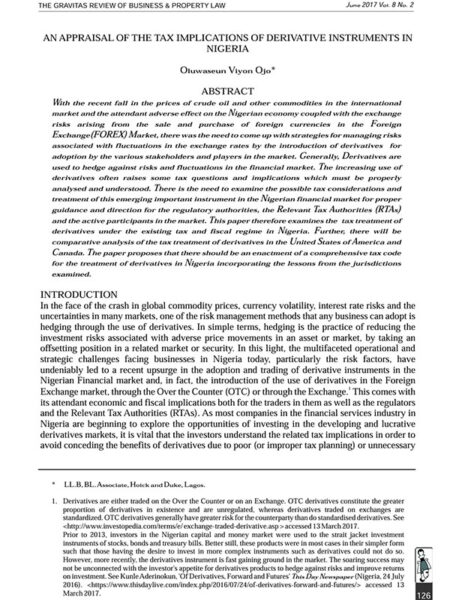
An Appraisal of the Tax Implications of Derivative Instruments in Nigeria
0₦2,500.00Oluwaseun Ojo, Associate, Hoick and Duke in his article, “An Appraisal of The Tax Implications of Derivative Instruments in Nigeria”, examines how instruments like futures, swap, options and forward contracts are used to hedge against risks and fluctuations in the financial market. He traces the use of Derivatives in Nigerian financial market and its tax treatment under the Companies Income Tax Act, the Capital Gains Tax Act and the Value Added Tax Act.
-
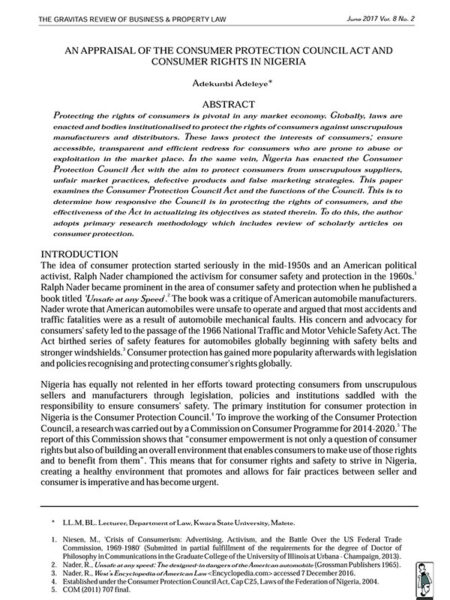
An Appraisal of the Consumer Protection Council Act and Consumer Rights in Nigeria
0₦2,500.00Adekunbi Adeleye Lecturer, Kwara State University, Malete in his article “An Appraisal of the Consumer Protection Council Act and Consumer Rights in Nigeria”, examines the legal framework for protection of consumer rights in Nigeria with emphasis on the Consumer Protection Council Act. He appraises the state of consumer rights in Nigeria and how effective the law has been in protecting consumers against unscrupulous suppliers, unfair market practices, defective products and false marketing strategies.
-
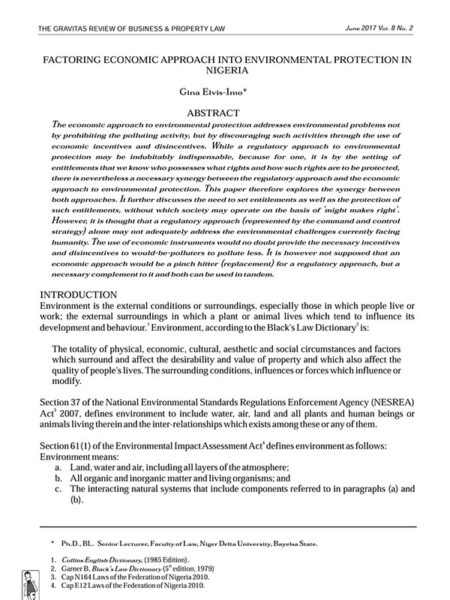
Factoring Economic Approach into Environmental Protection in Nigeria
0₦2,500.00Dr Gina Elvis-Imo, Senior Lecturer, Faculty of Law, Niger Delta University, Bayelsa State in her article “Factoring Economic Approach into Environmental Protection in Nigeria” examines various approaches, voluntary, regulatory and economic, to environmental protection. She argues that while a regulatory approach to environmental protection may be indubitably indispensable, the economic approach addresses environmental problems not by prohibiting the polluting activity, but by discouraging such activities through the use of economic incentives and disincentives. The paper explores the synergy between both approaches, and the need to set entitlements as well as the protection of such entitlements, without which society may operate on the basis of ‘might makes right’.
-
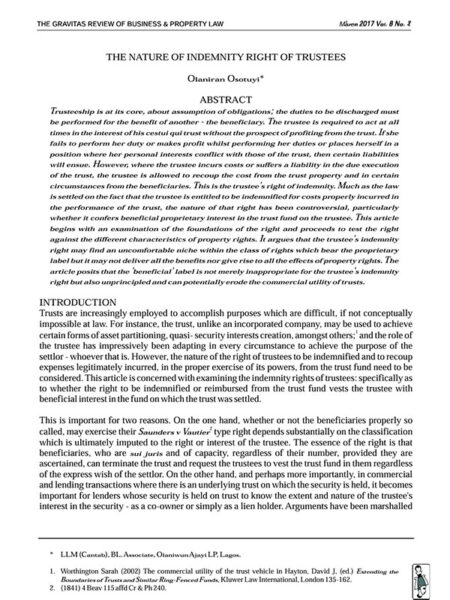
The Nature of Indemnity Right of Trustees
0₦2,500.00Olaniran Osotuyi, Associate, Olaniwun Ajayi LP examines “The Nature of Indemnity Right of Trustees”. While the law is fairly settled on the right of a trustee to be indemnified, to recoup the cost from the trust property and in certain circumstances from the beneficiaries for costs properly incurred in the performance of the trust, the nature of that right has been controversial, particularly whether it confers beneficial proprietary interest in the trust fund on the trustee. The article examines the foundations of the trustee’s right of indemnity and argues that while the trustee’s right may find an uncomfortable niche within the class of rights which bear the proprietary label, it may not deliver all the benefits nor give rise to all the effects of property rights
-
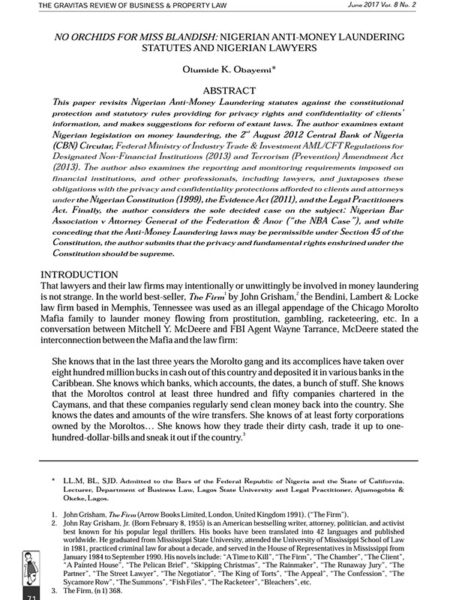
No Orchids For Miss Blandish: Nigerian Anti-Money Laundering Statutes and Nigerian Lawyers
0₦2,500.00Dr Olumide Obayemi of the Lagos State University and Legal Practitioner, Ajumogobia & Okeke, Lagos in his article, “No Orchids For Miss Blandish: Nigerian Anti-Money Laundering Statutes and Nigerian Lawyers” examines the concept of money laundering and comprehensively reviews extant Nigerian legislation and regulations on money laundering including the 2 August 2012 Central Bank of Nigeria Circular, Federal Ministry of Industry Trade & Investment AML/CFT Regulations for Designated No the Terrorism (Prevention) Amendment Act (2013). He examines the reporting and monitoring requirements imposed on financial institutions, and other professionals, including lawyers, and juxtaposes these obligations with the privacy and confidentiality protections afforded to clients and lawyers under the Nigerian Constitution (1999), the Evidence Act (2011), and the Legal Practitioners Act. He considers the case of the Nigerian Bar Association v Attorney General of the Federation on the issue and draws his conclusion.
-
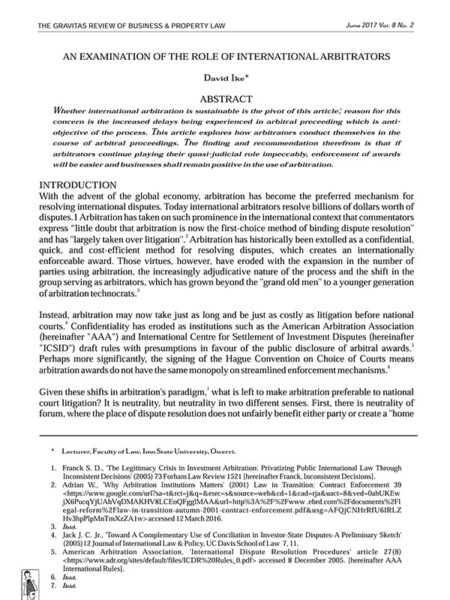
An Examination of the Role of International Arbitrators
0₦2,500.00David Ike,Faculty of Law, Imo State University, Owerri in his article “An Examination of The Role of International Arbitrators”,posits that while Arbitration has been extolled as a confidential, quick, and cost-efficient method for resolving disputes, those virtues have been eroded with the expansion in the number of parties using arbitration, the increasingly adjudicative nature of the process and the shift in the group serving as arbitrators. He considers the role international arbitrators should play in providing independent, adjudicative services to honour the parties’ expectations and contribute to the legitimacy of international arbitration. He explores the adjudicatory and administrative roles of arbitrators, opportunities to address misconduct during and after proceedings, and how market-based and institutional incentives are used to encourage appropriate conduct among arbitrators.
-
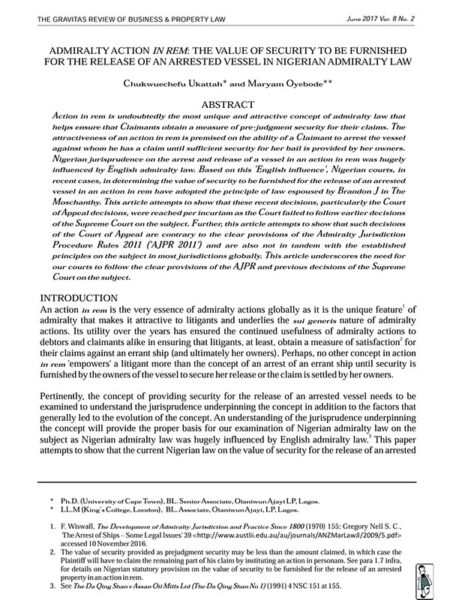
Admiralty Action in Rem: The Value of Security to be Furnished for the Release of an Arrested Vessel in Nigerian Admiralty Law
0₦2,500.00Dr Chukwuechefu Ukattah and Maryam Oyebode, Associates at Olaniwun Ajayi LP in their article “Admiralty Action in Rem: The Value of Security to Be Furnished for The Release of An Arrested Vessel in Nigerian Admiralty Law”, argue that an important attractiveness of an action in rem is the ability of a Claimant to arrest the vessel against whom he has a claim until sufficient security for her bail is provided by her owners. There have been discordant tunes among the courts on the value of the security to be furnished for an arrested vessel. The article argues that recent decisions by the Nigerian Court of Appeal, heavily influenced by the decision of Brandon J in the English case of The Moschanthy, were reached per incuriamas the Court failed to follow earlier decisions of the Supreme Court on the subject, and are contrary to the clear provisions of the Admiralty Jurisdiction Procedure Rules 2011.
-
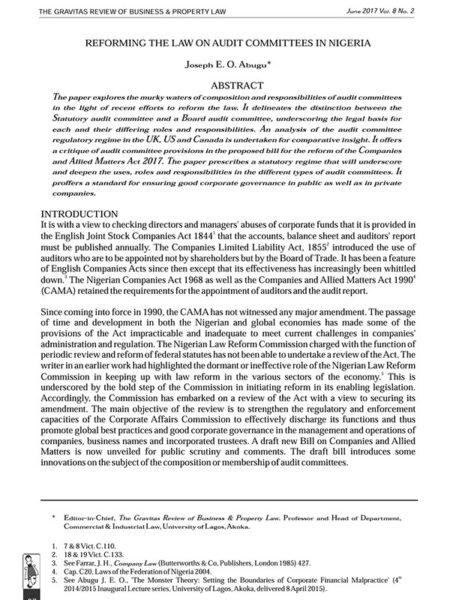
Reforming the Law on Audit Committees in Nigeria
0₦2,500.00Professor Joseph Abugu,Editor-in-Chief, The Gravitas Review of Business & Property Law and Head of Department, Commercial & Industrial Law, University of Lagos in his article “Reforming the Law on Audit Committees in Nigeria” against the background of the proposed bill for the reform of the Companies and Allied Matters Act 2017, explores the murky waters of composition and responsibilities of audit committees and delineates the distinction between the Statutory audit committee and a Board audit committee, underscoring the legal basis for each and their differing roles and responsibilities. He concludes with an analysis of the audit committee regulatory regime in the UK, US and Canada for comparative insight.
-
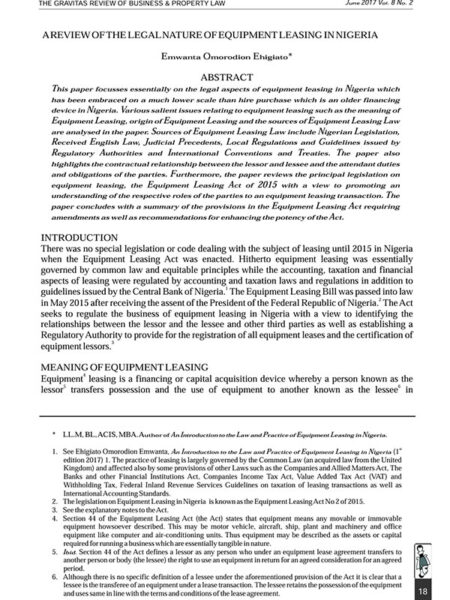
A Review of the Legal Nature of Equipment Leasing in Nigeria
0₦2,500.00Emwanta Ehigiato, author of An Introduction to the Law and Practice of Equipment Leasing in Nigeria in his article, “A Review of the Legal Nature of Equipment Leasing in Nigeria”, explores the legal aspects of equipment leasing which has been embraced on a much lower scale than hire purchase which is an older financing device in Nigeria. He analyses the legal framework for equipment leasing, the structure of an Equipment Lease Contract and obligations of parties. The paper undertakes a comprehensive review and commentary on the provision of the principal legislation on equipment leasing in Nigeria, Equipment Leasing Act of 2015.
The Gravitas Review of Business & Property Law



